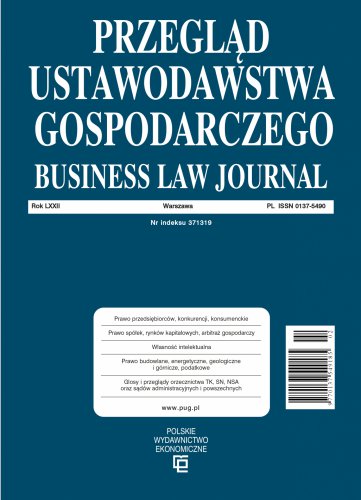Ecological Surety and Guarantee Fund
Improving air quality is an important goal for every country. For this purpose, various instruments can be used to support investors implementing ecological projects. In Poland, the catalog of such instruments was supplemented with the Ecological Surety and Guarantee Fund, established by law and entrusted to service by Bank Gospodarstwa Krajowego from 1.01.2021. It provides sureties and guarantees for the repayment of loans granted by commercial banks for ecological investments for the purpose of limiting the negative effects of emissions from heating systems used in single-family houses. The aim of this article is to analyze and evaluate the legal regulations defining the legal position and principles of operation of the Ecological Surety and Guarantee Fund. It has been shown that the fund enables the parallel use of private and public law instruments for supporting environmental investments. At the same time, activities of some units of the public finance sector, banks and government administration bodies are integrated around these projects. The Fund may constitute a significant supplement to the activities of a systemic nature aimed at more effective implementation of the Government Program "Clean Air". The effects obtained in the first year of operation of this fund are very modest, but the causes for this situation do not have to be solely related to the applicable legal regulations. The very unfavorable market situation, including high inflation, an increase in loan servicing costs and current expenses burdening households may be related to little interest in the banks' offer in terms of loans for environmental investments. As a result, the resources of the fund dedicated to securing the return of such loans in the form of sureties and guarantees cannot be fully used.
References
Bańko, M. (Red.). (2005). Wielki słownik wyrazów bliskoznacznych PWN. Wydawnictwo Naukowe PWN.
Dobosiewicz, Z. (2011). Bankowość. Polskie Wydawnictwo Ekonomiczne.
Głuchowski, J. (2002). Podatki ekologiczne. Dom Wydawniczy ABC.
Gruszecki, K. (2019). Prawo ochrony środowiska. Komentarz. Wolters Kluwer.
Kosikowski, C. (2008). Fundusze celowe nieobjęte ustawą o finansach publicznych. W: C. Kosikowski, & E. Ruśkowski (Red.), Finanse publiczne i prawo finansowe (428–429). Oficyna. A Wolters Kluwer business.
Kosikowski, C. (2011). Naprawa finansów publicznych w Polsce. Wydawnictwo Temida 2.
Kożuch, M. (2018). Zmiany w finansowaniu przedsięwzięć ochrony środowiska przyrodniczego w Polsce. Zeszyty Naukowe UE w Krakowie, (1/973), 61–78. https://doi.org/10.15678/znuek.2018.0973.0104
Ofiarska, M. (2021). Zmodyfikowane zasady udzielania i rozliczania premii termomodernizacyjnych. Przegląd Ustawodawstwa Gospodarczego, (11), 16–24. https://doi.org/10.33226/0137-5490.2021.11.3
Ofiarski, Z. (2021). Prawo bankowe. Wolters Kluwer.
Ofiarski, Z. (2013). Prawo bankowe. Komentarz. Wolters Kluwer.
Owsiak, S. (2002). Podstawy nauki finansów. Polskie Wydawnictwo Ekonomiczne.
Sikorski, S. (2015). Rola i organizacja Narodowego oraz Wojewódzkich Funduszy Ochrony Środowiska i Gospodarki Wodnej. Białostockie Studia Prawnicze, (18), 149–165. https://doi.org/10.15290/bsp.2015.18.12
Skarbek, M. M. (2003). Rola i zadania BGK. Bank, (5), 15–16.
Skuza, S. (2013). Bank Gospodarstwa Krajowego as an institution running bank accounts for public finance sector entities. The current situation and self-designed proposals for change. W: J. Gliniecka, E. Juchniewicz, T. Sowiński, & M. Wróblewska (Red.), System prawnofinansowy. Prawo finansowe wobec wyzwań XXI wieku (381–388). CeDeWu.
Susmarski, S. (2016). Wybrane problemy oceny efektywności funduszy publicznych na podstawie Oddziałów Wojewódzkich Narodowego Funduszu Zdrowia. Annales Universitatis Mariae Curie-Skłodowska. Sectio H – Oeconomia, 50(4), 467–476. https://doi.org/10.17951/h.2016.50.4.467
Szołno-Koguc, J. (2007). Funkcjonowanie funduszy celowych w Polsce w świetle zasad racjonalnego gospodarowania środkami publicznymi. Wydawnictwo UMCS.
Żukowski, M. (2012). Ocena działalności Banku Gospodarstwa Krajowego w kontekście jego zadań i potrzeb polskiej gospodarki. W: I. Pyka & J. Cichorska (Red.), Finanse w niestabilnym otoczeniu – dylematy i wyzwania. Bankowość (s. 507–515). Wydawnictwo Uniwersytetu Ekonomicznego w Katowicach.

